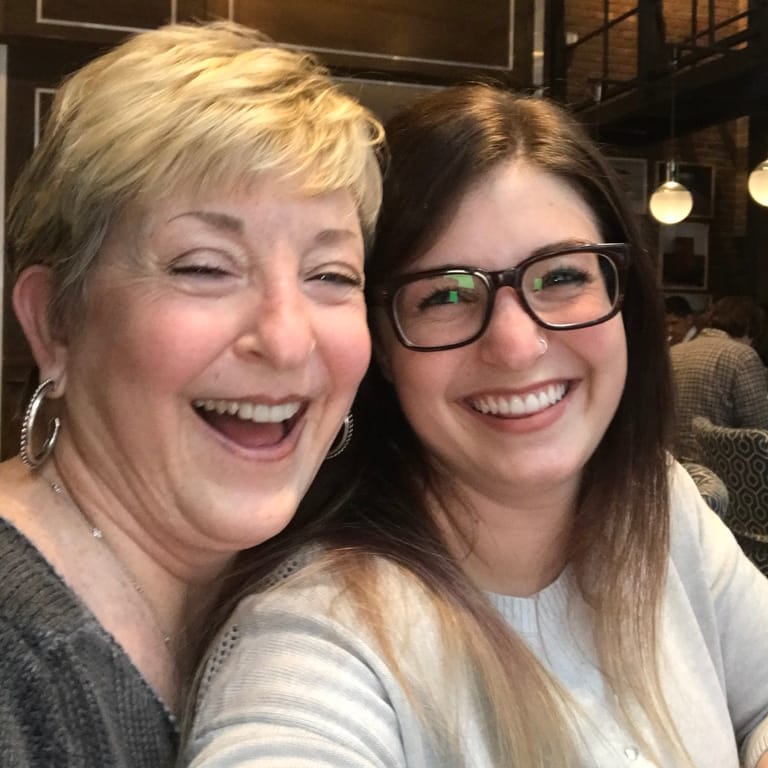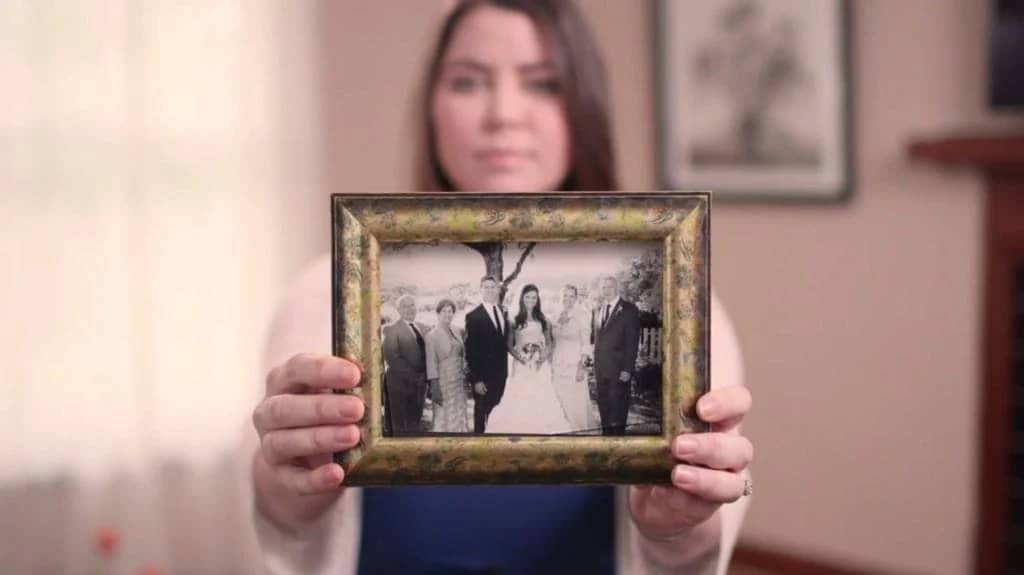
Lauren shared her story in April of 2024.
My mom had always been in generally good health, so in 2017 when a routine colonoscopy came back with polyps that turned out to be stage 2A colon cancer, we were shocked. But after surgery to remove the cancer, every step of the way we got good news — nothing in the lymph nodes, no chemo needed. Every follow-up scan was clear.
But it made us more aware of the reality of what “could’ve been” and got us talking.
During that time, Mom showed me an article in People magazine about a young woman who was diagnosed with terminal cancer, and seeking to avoid extended suffering in her last days had moved with her husband to Oregon to access medical aid in dying. My mom said to me, “This is what I would want to do. I wouldn’t want to suffer or draw it out. Let me be with the people that I love and go peacefully on my own terms!”
With her scans remaining clear of colon cancer, the conversation felt theoretical. Then in early summer 2022, Mom started having severe back pain, then neck and head pain. She went to the doctor, to the chiropractor, to specialists, neurologists and the emergency department multiple times. They did X-rays and CT scans and gave her some pain medications, medical marijuana, shots, physical therapy, and even nerve blocks. Nothing helped. For months my mom was in constant, worsening pain by the day, and still without an answer of what was going on.
Finally in November, one night my mom was crying from the pain and my stepdad decided to take her to the ER again, but this time he decided to take her to a different hospital (since the closest one had not discovered the source of her suffering nor done anything meaningful to mitigate her pain). After explaining the situation to the new set of medical providers, they did X-rays and a CT scan once again, but went a step further and provided my mom an MRI.
Nobody in nearly six months had been willing to order an MRI. And that’s when they saw it — metastasized cancer up the entirety of my mother’s spine and in the lining of her brain. That was the Friday before Thanksgiving. I left my home in Maine that following Monday to be with her, and I was with her in Pennsylvania until she was gone.
We spent the next few weeks trying to figure out where the cancer started because without knowing that, doctors couldn’t know if or how we could treat it. They were checking in her bladder, her kidney, her bones, but they were struggling to find where it had started. Meanwhile, Mom remained in unbearable pain despite doctors trying to manage it with morphine and other pain meds. Finally the urological oncologist did some testing and said there were no signs of tumors, but the lining in her tubes looked “fluffy,” which could be a sign of a very rare cancer. Mom was one of a kind, so maybe we should’ve known.
It was plasmacytoid urothelial cancer, an extremely aggressive and rare form — only 1% to 3% — of bladder cancer. It had started in her ureter. There was no mass, just cancerous cells, therefore it was incredibly difficult to detect. This type of cancer is usually not found until it has already metastasized.
Mom could try treatment, but the treatment, the doctors said, would likely kill her faster because of how progressed the cancer was. Then, because she lived in Pennsylvania, a state with no medical aid-in-dying law in place, the other option she was given was palliative care, then transitioning to hospice. On December 16, my mother made the brave decision to not fight this cancer that was ultimately going to take her life no matter what she did.
Knowing my mother’s wishes, I started looking into the option she really wanted: medical aid in dying. Could she come back home with me to Maine to access medical aid in dying? No, she had to be a resident. Could we get her to Oregon or Vermont (where medical aid in dying is now available to out-of-state residents)? What were the requirements? How would we find a doctor? I doubt she could even endure the travel.
I was met with some harsh realities. Mom was weak, getting weaker and relying on ‘round-the-clock pain medication for comfort at this point. It seemed as though we had missed the opportunity where travel would’ve been an option for us. Mom spoke with every single doctor about her wishes, “I’d like medical aid in dying. I want support in dying.” It was so incredibly painful to listen to her clearly request medical aid in dying and to have her healthcare team unable to help her and in essence force her to endure prolonged suffering. Their answer was always the same: “We can make you comfortable,” or something along those lines.
But she wasn’t comfortable. She was in very significant pain while she was in the hospital, and on December 19 we took her home. She was at least happier in her own space, so my stepdad and I took care of her with the help of amazing hospice nurses who came daily. It is the thing I am most proud of in my entire life — being there for her and taking care of her in the hospital and at home. I would do it 100 times over. But it also got really hard. The hardest part was knowing it wasn’t what she wanted. She wanted to die on her own terms. Instead, she experienced exactly the end she feared.
She slowly deteriorated, losing her ability to walk, feed herself and take care of her most basic needs, and her voice became so faint as her body became weaker and weaker. By the end she wasn’t able to leave the hospital bed in our living room.
My mom was my person. She was my everything. She embodied such a strong, positive and independent woman. While working full-time, she lovingly raised me and my siblings and earned her master’s degree. She modeled how to “do it all” gracefully and in heels. When we were together, we were always giggling and smiling. As a kid I remember I would do absolutely anything to make her laugh. If she was on the phone, I would get in her line of sight and do silly dance moves just to make her laugh; it’s just how we communicated. The absence of her laughter and smile is so palpable, and her loved ones never doubted her unconditional love.
My mother deserved better. She wanted to go out while she was still in control. And she did not get that chance.
Two days before she died, Mom was lying in her hospice bed and gathered our family around her, and she told us she was ready to die. She said she needed each of us to tell her that it was OK for her to go, and one by one we did. Then she told us she loved us and we told her we loved her, and she laid back and closed her eyes. I think she truly thought she had control in that moment and she’d just take her last breath and go.
After a while she woke up, and I was sitting next to her. We were alone, and she looked me in the eyes and said, “This is my nightmare.” And I knew exactly what she meant. “I know, Mom. I’m so sorry,” was all I could say to her.
Every day watching her, knowing that I couldn’t help her, knowing that we couldn’t give her what she wanted, was so incredibly disheartening and infuriating. It broke my heart to let her down, but it breaks my heart more that the state of Pennsylvania let her down.
My mom’s last weeks were not peaceful — to be fading away and in immense pain while having to watch her loved ones see her go that way. And Mom’s last 36 hours were long and hard. She had become unresponsive, and as her pain escalated, we went from providing her liquid morphine every hour to every half hour, then every 20 minutes for her last eight hours. Seeing her writhe and groan in pain was devastating. I truly hope the morphine made an impact. It was, as she put it in her own words, her nightmare. She died at 8:07 p.m. on January 6, 2023.
When I think about the right to live freely, I think about the right to die freely. I want medical aid and dying to be available in all 50 states. Where you live should not determine your access to a gentle end. If you’ve watched someone go through the horrors of a terminal illness, medical aid in dying is an option that provides such relief, and I wish that my mom had had access to medical aid in dying. If she had, it would’ve made her diagnosis mentally easier for her to handle; it would’ve made the experience of dying easier for her. And even if it would’ve meant that I had less time with her, I would’ve been more at peace knowing that she wouldn’t have suffered nearly as much as she did. The variant of cancer my mom had is just what it was. But God, she deserved to decide when she had suffered enough. Why wouldn’t we want to make these impossibly hard situations as easy and smooth and pain-free as possible for those that we love?

Nothing advances our common cause of improving end-of-life care like real stories. Inspire others and drive change by sharing your story today.
Mail contributions directly to:
Compassion & Choices Gift Processing Center
PO Box 485
Etna, NH 03750